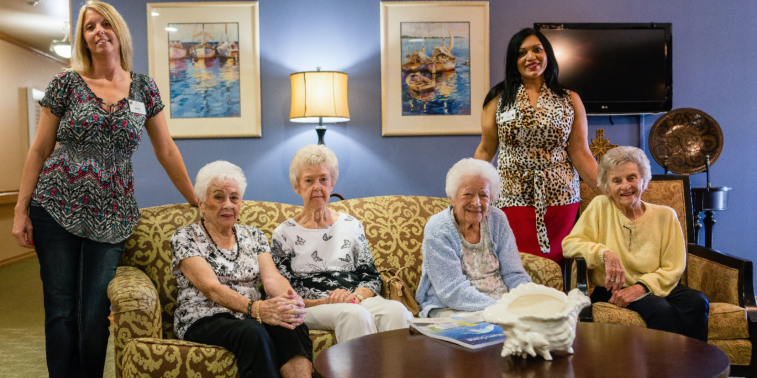Choosing the Perfect Charlotte Care Home: Trick Elements to Consider for Your Family

Recognizing Mental Deterioration Care: A Guide for Loved Ones
The complexities of mental deterioration care require a nuanced understanding that prolongs past basic understanding of the problem itself. For liked ones, identifying the very early symptoms and executing effective interaction techniques are crucial in fostering a helpful atmosphere. Caretakers need to not overlook their own health, as it considerably impacts their capacity to provide caring treatment. As we discover these important parts, it comes to be obvious that the journey of understanding dementia care is not simply concerning the private affected, yet likewise regarding the detailed dynamics that shape their connections and experiences. What understandings can transform this journey?
What Is Mental deterioration?
Dementia is a cumulative term that includes a variety of cognitive problems identified by a decline in memory, thinking, and social capabilities severe enough to hinder every day life. It is not a certain condition but instead an umbrella term that includes different sorts of cognitive problems, with Alzheimer's disease being one of the most widespread. Various other types consist of vascular mental deterioration, Lewy body dementia, and frontotemporal mental deterioration, each with distinctive qualities and underlying reasons.
The beginning of mental deterioration commonly includes gradual cognitive decrease, influencing the individual's ability to execute everyday jobs and engage meaningfully with others. These impairments can materialize as problems with interaction, problem-solving, and judgment. As dementia proceeds, individuals may experience changes in mood and actions, which can even more complicate their care and social communications.
Comprehending mental deterioration is crucial for families, caretakers, and medical care professionals to give ideal assistance and interventions. Early medical diagnosis and treatment can help manage signs and boost the top quality of life for those impacted. In addition, it fosters a much deeper understanding of the obstacles dealt with by individuals with dementia, highlighting the importance of caring treatment and support throughout their trip.
Identifying the Symptoms
Recognizing the signs and symptoms of mental deterioration early is important for efficient treatment and assistance - memory care charlotte. Mental deterioration encompasses a series of cognitive disabilities that can materialize in different ways, usually hindering day-to-day functioning and top quality of life. Common early signs and symptoms include memory loss, particularly forgetting current occasions or conversations, which might originally be disregarded as normal aging
As the condition proceeds, individuals might display problems with problem-solving, preparation, or completing familiar tasks, such as taking care of finances or adhering to a dish. Complication about time or place usually emerges, bring about disorientation and stress and anxiety. Adjustments in state of mind and behavior are likewise significant indicators; people might become taken out, short-tempered, or exhibit passiveness towards activities when enjoyed.
In addition, challenges in language can emerge, materializing as difficulty in discovering the appropriate words or adhering to conversations. Acknowledging these signs and symptoms early can assist in prompt medical analysis and care preparation. It is vital to come close to these observations with level of sensitivity and understanding, as they can be stressful for both the individual and their enjoyed ones. Motivate interest to these indications can lead to better results and assistance for those affected by mental deterioration.
Efficient Communication Approaches

Non-verbal hints play an essential role in interaction. Preserving eye contact, using ideal faces, and using motions can assist convey your message better. Furthermore, creating a distraction-free environment can additionally promote purposeful communications.
Active listening is essential; offer the individual ample time to respond without disrupting. Validate their experiences and sensations, which fosters depend on and encourages open discussion. When going over familiar topics or memories, make use of triggers to direct the conversation, aiding them feel involved and valued.
Lastly, be prepared to adjust your approach based upon the individual's present cognitive state. Versatility in interaction approaches ensures that you stay linked, strengthening the significance of your partnership. By executing these strategies, you can create a helpful ambience that motivates positive interactions with individuals affected by dementia.
Developing a Supportive Atmosphere
Producing a supportive environment is important for improving the high quality of life for individuals with mental deterioration. This setting needs to focus on experience, safety and security, and comfort to reduce anxiety and complication.
Integrating regimens can offer a feeling of stability. Predictable routines assist individuals with dementia directory recognize what to expect throughout the day, consequently reducing sensations of disorientation. Personalizing the home with familiar products, photos, and tokens can evoke positive memories and create a sense of belonging.
In addition, think about the sensory facets of the setting. Soft colors, calming scents, and mild audios can add to a tranquil ambience. Balance excitement to stay clear of frustrating the individual; peaceful areas for relaxation must complement a lot more energetic rooms for social interaction.
Self-Care for Caregivers
Sustaining individuals with mental deterioration calls for not only a well-structured atmosphere yet also focus to the wellness of caregivers. Caregivers often encounter psychological, physical, and psychological difficulties that can bring about exhaustion if not appropriately dealt with. Prioritizing self-care is vital to keep their health and efficiency in offering care.
First, caregivers need to develop a normal routine that includes time for personal activities and leisure. Participating in pastimes, workout, or simply walking can significantly ease tension. It is vital to maintain a well balanced diet and guarantee ample sleep to enhance physical durability.
Furthermore, caretakers need to seek social assistance. This can be completed by signing up with support system, engaging with close friends, or speaking with member of the family concerning their experiences and sensations. Such connections help caretakers feel much less separated and supply useful try this out emotional electrical outlets.
Last but not least, caregivers should not wait to look for professional assistance when required. Consulting mental health experts can aid in establishing coping methods and offer devices for handling the emotional toll of caregiving. By actively practicing self-care, caretakers can boost their wellness, eventually profiting both themselves and the individuals they look after.
Verdict
In final thought, comprehending mental deterioration treatment is important for enhancing the high quality of life for individuals affected by this problem. In addition, prioritizing self-care for caregivers ensures their well-being, inevitably profiting both caretakers and those getting treatment.
As we explore these vital components, it ends up being obvious that the trip of understanding mental deterioration treatment is not just concerning the specific impacted, however also regarding the detailed characteristics that shape their experiences and relationships. Various other forms include vascular dementia, Lewy body mental deterioration, and frontotemporal dementia, each with unique features and underlying reasons.
As mental deterioration advances, individuals might experience changes in mood and habits, which can further complicate their care and social communications.
Additionally, it cultivates a much deeper understanding of the difficulties dealt with by people with dementia, highlighting the significance of compassionate care and assistance throughout their journey.
In verdict, recognizing mental deterioration care is essential for enhancing the high quality of life for people influenced by this problem. (memory care charlotte)